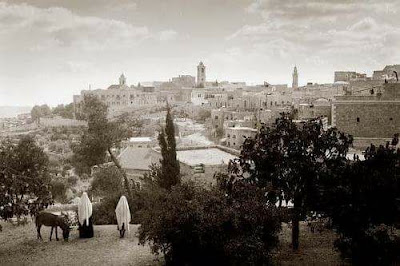Informative, inspiring and entertaining facebook posts today from my friend Mike -
So I was in the Mall yesterday when I heard some ladies discussing #Christmas and the weather. A couple of them had just gotten back from Florida and were commenting about palm trees decorated with lights and how out of place it felt, and so, once again, sensing an opportunity to educate and inform, I chimed in by asking them if they had ever seen a Nativity Scene. "Of course" they all replied. I them asked what kind of tree is always included in those scenes. They gave me a puzzled look, and finally one of them said "I am almost sure its a palm tree". I said that is correct, a palm tree because the trees that you are used to seeing decorated originated in European tradition, not #Palestinian because those trees are not at all native to #Palestine, the birth place of #Jesus., while palm trees are.
I then asked them why is a palm tree included in the nativity scene, and of course none of them knew, thinking it was there for "decoration". I then informed them that in the Quran, where the blessed Virgin Mary has her own story, we are told that after having given birth, weak and hungry, the Archangel Gabriel appeared to her and instructed her to "nudge the palm tree" for sustenance, whereby ripe dates would fall for her to eat, and today, science has proven that dates are a "super food"...They were amazed, and by now I had an audience of about 10 people, and so we went in depth about Palestine, Islam and Jesus, and I was peppered with questions which I was most certainly more than happy to answer, complete with pictures because I "conveniently" keep thousands of relevant photos of Palestine, #Bethlehem, and #Jerusalem...One at a time
Jesus is Born
The pains of childbirth drove her to clutch at the trunk of a date-palm tree and she cried out in anguish:
“Would that I had died before this, and had been forgotten and out of sight!” (Quran 19:23)
Mary delivered her child right there, at the foot of the date tree.
She was exhausted after the birth, and filled with distress and fear,
but nevertheless she heard a voice calling out to her. .
“Grieve not! Your Lord has provided you a stream of clear water under you; and shake the trunk of palm tree towards you; it will let fall fresh ripe dates upon you. So eat and drink and be glad...” (Quran 19:24)
God provided Mary with water, as a stream suddenly appeared beneath the place she was sitting. He also provided her with food; all she had to do was shake the trunk of the date tree. Mary was scared and frightened; she felt so weak, having just given birth, so how could she possibly shake the immense trunk of a date tree? But God continued to provide Mary with sustenance.
The next event was indeed another miracle, and as human beings we learn a great lesson from this. Mary didn’t need to shake the date tree, which would have been impossible; she only had to make an effort. As she attempted to follow God’s command, fresh ripe dates fell from the tree and God said to Mary: “…eat, drink and be glad.” (Quran 19:26)
Mary now had to take her new born child and go back to face her family. Of course she was afraid, and God knew this well. Thus He directed her not to speak. It would not have been possible for Mary to explain how she had suddenly become the mother of a new born child. Since she was unmarried, her people would not believe her explanations. God said:
“And if you see any human being, say: ‘Verily! I have vowed a fast unto the Most Gracious (God) so I shall not speak to any human being this day.’” (Quran 19:26)
“Grieve not! Your Lord has provided you a stream of clear water under you; and shake the trunk of palm tree towards you; it will let fall fresh ripe dates upon you. So eat and drink and be glad...” (Quran 19:24)
God provided Mary with water, as a stream suddenly appeared beneath the place she was sitting. He also provided her with food; all she had to do was shake the trunk of the date tree. Mary was scared and frightened; she felt so weak, having just given birth, so how could she possibly shake the immense trunk of a date tree? But God continued to provide Mary with sustenance.
The next event was indeed another miracle, and as human beings we learn a great lesson from this. Mary didn’t need to shake the date tree, which would have been impossible; she only had to make an effort. As she attempted to follow God’s command, fresh ripe dates fell from the tree and God said to Mary: “…eat, drink and be glad.” (Quran 19:26)
Mary now had to take her new born child and go back to face her family. Of course she was afraid, and God knew this well. Thus He directed her not to speak. It would not have been possible for Mary to explain how she had suddenly become the mother of a new born child. Since she was unmarried, her people would not believe her explanations. God said:
“And if you see any human being, say: ‘Verily! I have vowed a fast unto the Most Gracious (God) so I shall not speak to any human being this day.’” (Quran 19:26)
Bethlehem, Palestine...Circa 1898










